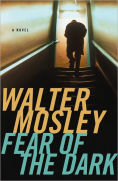Mosley’s fans know that his many novels, including the Easy Rawlins and Fearless Jones mysteries, are rousing adventures that navigate the liminal areas that lie in the shadow of good and evil, guilt and innocence. While we race along with the narrator, trying to avoid danger and death while figuring out just what is going on and what to do about it, we are testing our own moral code.
This addition to the Fearless Jones collection is narrated by Fearless’s friend Paris Minton, bookstore owner and ferocious reader. Most of Paris’s problems follow visits from his cousin Ulysses “Useless” Grant, a petty crook who spreads trouble in his wake. Although Paris turns Useless away at the door, refusing to help him, trouble comes in the door anyway. Luckily Paris can turn to his friend Fearless—a man Paris says is “outside the law” and “stronger of thew and character than any other man I had ever met.”
For me, the great joy and value of fiction—all fiction, highbrow or lowbrow, genre or literary, ebook or audio, text or graphic novel—is the chance to live someone else’s life. In Wired for Story, Lisa Cron explains the biology behind our deep-rooted desire for virtual adventures: stories are how we learn about the world and test our abilities. Most of all, to my mind, they increase our empathy by enabling us to see the world through someone else’s eyes and by forcing us to fill in the gaps with our own emotions and experiences.
Walter Mosley’s novels let me encounter the world as a black man, an especially difficult and valuable stretch for me. This particular book is set in Los Angeles of the 1950s: not the easiest time to be a black man in this country. Without disrupting the flow of the story or preaching, Mosley gently reminds us of just how different life was and is for a black man than for someone, say, like me.
The most explicit moment comes when Paris comes upon a white man lying dead on the bookstore floor. He calls Fearless for help, and he brings a friend to help dispose of the body. Paris says:
There I was, in a truck with desperate men. I was a desperate man. It was hard to believe that a milquetoast coward like myself could be involved in such a clandestine and dangerous operation. But the reasons were as clear as the quarter moon shining through the windshield.
All three of us were living according to black people’s law. The minute I came upon that white boy’s body I knew that I would be seen as guilty in the eyes of American justice. Not even that—I was guilty. There was no jury that would exonerate me. There was no court of appeals that would hear my cries of innocence.
I wasn’t a brave man like Fearless or a born criminal like Van Cleave, but we all belonged in that truck together. We had been put there by a long and unremitting history. My guilt was my skin, and where that brought me had nothing to do with choice or justice or the whole library of books I had read.
This is not empty polemic. It is a necessary explanation of why Paris doesn’t just call the police when he finds a dead body on his property. It is why this quiet man gets drawn into the dangerous currents of the criminal underworld.
Being such a big reader explains Paris’s voice being a little more florid than today’s readers might be accustomed to. One area where I particularly noticed his voice was in the descriptions of every character, even the most minor walk-on extra. As David Corbett points out in a recent blog post, “the ability to describe the human face in fiction seems to be, if not a dying art, at least in a state of decline, even indifference.”
In this story Mosley mixes it up. He makes use of faces, posture, clothing and behavior to bring his characters memorably to life. Here are some examples:
Jessa was wearing an orange sundress that had little white buttons all the way down the front. The collar had a little dirt on it. Her red purse was scuffed.
Mona was a beautiful young woman. She was Negro and she was brown, but the brown mixed with gray everywhere in her appearance. Her skin was touched by it; her eyes sometimes shone with lunar possibilities. Even her hair seemed to be lightened by the midtone color.
Rinaldo had copper skin and slicked-back hair that did not seem straightened. He was missing one tooth and stood and walked in a hunched-over posture that he blamed on forty years leaning over pool tables.
Cleetus Rome, an elderly white man, . . . was old and toothless. He smelled something like dust or maybe even loam and he always bought magazines from me that had swimsuit models on the covers.
I was especially interested in the different ways Mosley describes skin color. He never falls back on the overused “coffee” or “mocha” but instead imagines the particular tone of a character’s skin.
As a writer and as a person I am learning a lot from this book. Even after providing an exciting read, it continues to reward further study.
Have you read a mystery or thriller that transported you to another world?

